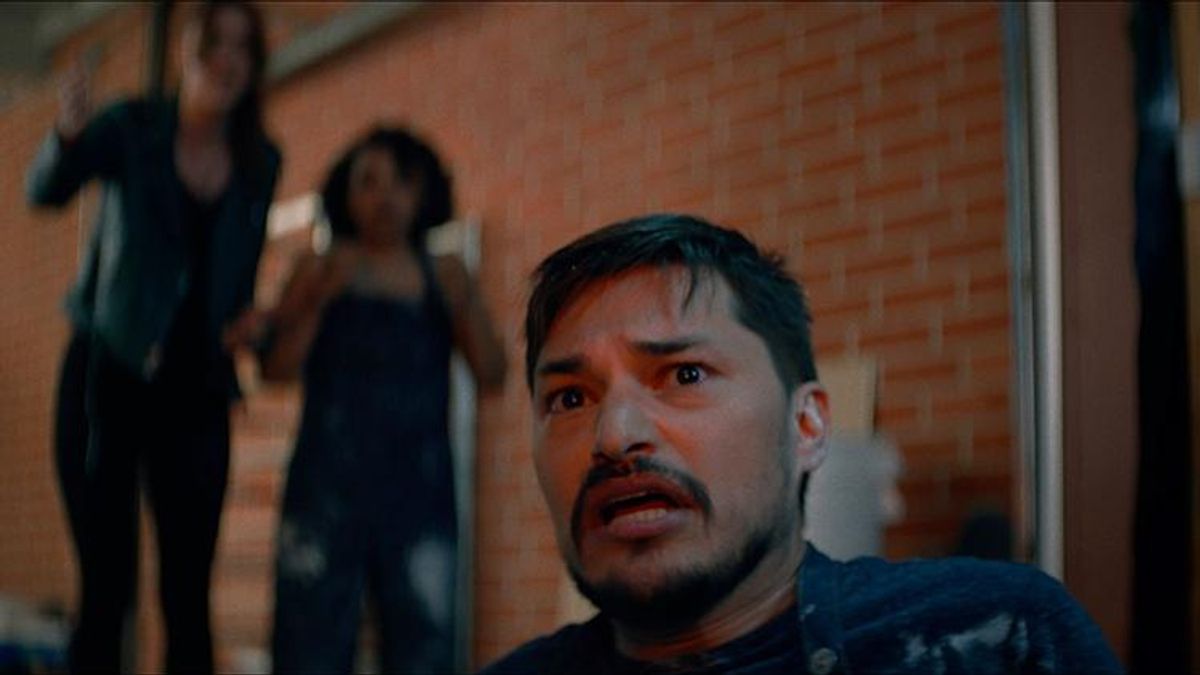"You'd be shocked at how the mind can affect the body" is both the thesis of director Addison Heimann's new horror film, Hypochondriac, and the phrase that haunts the character of Will (Zach Villa) as he spirals deeper and deeper down into paranoia that his body's betraying him and a supernatural creature is hunting him.
Will is a young gay Hispanic potter whose life is pretty great when audiences first meet him. He has friends, an amazing boyfriend, and a job working for an upscale pottery. But anyone who has experienced periods of anxiety, depression, and panic attacks will identify with his journey, because he's also plagued by a past that still has its hands wrapped around his throat -- and when it reemerges without warning, things take a dark and monstrous turn.
It begins with physical manifestations: issues with his hands and arms that begin spreading further throughout his body, leading him to fear that something's terribly wrong with him. Then there are visions of a wolf-like creature that appears intent on devouring him.
If this sounds like a terrifying film, imagine living through much of this for real; for Heimann, many of the most frightening moments in the film are ripped directly from his own life. "So basically, my mom's bipolar. And in the winter, Christmastime of 2018, I went home. I was staying with her the whole time, and she was in a pretty bad episode," he tells The Advocate. Heimann explains that while he was there, he felt himself falling into a similar fog, one that didn't dissipate as expected when he returned home -- and he began experiencing dizziness, nausea, and tingling sensations up and down his body. "So I just had to do the smartest thing: I visited Dr. Google. And Dr. Google, oh, she told me that I was dying of ALS," he recalls.

What Heimann didn't realize at the time was that he has obsessive-compulsive disorder, specifically intrusive thoughts, that caused him to become increasingly convinced that he was dying. To make matters worse, he sustained two injuries; the first was a repetitive strain injury in both of his arms -- from a very physically demanding job he took specifically to prove to himself that he wasn't becoming weaker -- and a leg injury he received while once again going too hard on an exercise bike when he was trying to "outrun the panic." Needless to say, it all backfired. "I really give [my intrusive thoughts] power by making them real," he shared. All of this pain, fear, and trauma is poured into the screenplay for Hypochondriac that sees Will go down a similar path, and the effect is both chilling and moving.
Another source of horror in the movie is taken from Heimann's own experiences with medical professionals. In the film, Will meets with various doctors while exhibiting signs of increasing distress and desperation, yet they repeatedly dismiss his terror, saying that it's all in his head. "A lot of these doctors are based on actual doctors that I saw," shares Heimann. "When you potentially can say it's anxiety, you're not listened to." His father would tell him that what he was experiencing was all in his head, and while that might ultimately have been true, that's hardly the point. "I'm like, 'That's not helpful to me. It's not helpful! It feels real, it doesn't matter if it's in my mind because it feels real.'"

One of the bright spots of the film is the relationship between Will and his boyfriend of seven months, Luke (Devon Graye). The chemistry between them is fiery, sexy, and sweet -- and unapologetically queer. All of this was important for the out director to include in his film. "As a queer person, and especially moving forward after my mental breakdown, all the stories I want to tell are just queer genre stories that explore mental health -- that's kind of my bag," he says. That being said, it's also essential to Heimann that the stories be a mix of ones where queerness is at the center of the narrative and those where it's not. In essence, it's that the characters' queerness is incidental to the story, much like in Hypochondriac itself, which never sacrifices Will's identity as a gay man while telling a story that's about another aspect of himself. It's one of the great strengths of this film and an example that could be followed by other creators working in the genre.

The film is effectively frightening, heartbreaking, and disturbing at turns (some domestic violence scenes are shocking -- intentionally so -- but audiences should still be prepared), Heimann also infuses hope in what could easily be interpreted as a hopeless place. "I need these characters to be OK, especially when I'm really talking about me, because I'm OK," laughs Heimann. "For me, the end of the movie is hopeful," he shares. "My hypochondria has not gone away. But with a therapist and my aunt who's a doctor, thank God I'm able to at least piece together some semblance of a happy-ish life ... I think [that's] the whole point of the ending."
Hypochondriac made its world premiere at SXSW. This review is part of our coverage of the SXSW 2022 Film Festival.





















































































Fans thirsting over Chris Colfer's sexy new muscles for Coachella